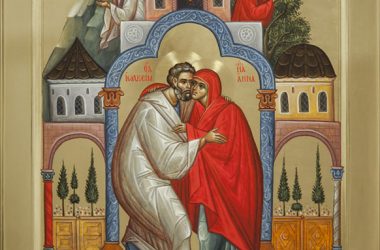Metropolitan Nektarios Antonopoulos
The Holy Fathers of our Church called repentance “the second baptism” or “the renewal of our baptism.” With our first baptism we start a journey towards the Kingdom of God. God, our Father, out of His Love, knowing our human helplessness and the eventuality of our fall, gave us the second baptism, which is repentance, the man being able by its means to get up from his fall, to heal his wounds and to continue his difficult journey. Unfortunately very few of us know what repentance truly means and which is its deepest meaning. Most of us don’t know at all what repentance is nor why we should repent.
Repentance is not, as we believe, a legal procedure which frees man of certain feelings of guilt. Nor is it a trite confession, made by someone before the great religious feasts or when facing hardships. The prodigal son’s attitude and return mean something else.
As the word shows it, repentance (metanoia) means a complete change of someone’s life, the relinquishment of all sins from the bottom of the heart, the change of mentality. Meaning to feel with all our being that the path we are going on doesn’t lead us anywhere and we have to go back. To feel that we’re living in a straw barn, outside the house of our Father and to say: “But where are we going?” “Our Father has palaces where everybody rejoices and we would stay in the mud?” And then to decide to go back, to re-enter the parental home, to reconcile with God and our brothers.
Repentance must be efficacious in order to be true. Saint Kosmas the Etolian says: Even if all the priests, patriarchs and bishops and everyone else forgave you, you are unforgivable if you do not repent in deed. Meaning that if we don’t want to move away from sin and change our life, then our repentance is not real. It is not at all a true repentance.
Many come enthusiastically for confession, pressed by their psychological problems or other troubles they have. They confess with tears in the eyes and promise that from now on they won’t sin anymore and they would change their life etc.
But something like this may not have any connection with true repentance and this should make us be quite suspicious. Because repentance is not some fireworks, it requires time, painstaking, ascesis, ascetic struggle under the grace of God and is patiently and secretly growing in the soul of man.
As if a man should scatter seed on the ground. He sleeps and rises night and day, and the seed sprouts and grows; he knows not how. And the earth produces by itself.[1]
In fine, repentance is the work of the divine grace. The man living in the darkness of sin and not knowing the beauty of the divine life, cannot understand the difference between the earthly human life and the divine human life.
Only when the divine grace drops in the heart of man the seed of divine love, he will see his spiritual emptiness. Only when sunlight enters a dark room it will reveal everything. Likewise, only when the grace of God enlightens our souls we see our inner desolation, passions and sins. That is why our Saints were insistently asking God: “Give me complete repentance!” This real repentance is the safe way which leads to the kingdom of God.
[1] Mark 4, 26-28






